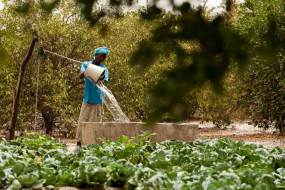Daegu/Rome/Washington, D.C. – FAO, UNESCO, the World Bank, GEF and the International Association of Hydrogeologists have on 10 April 2015 called for action by the global community to manage the increasingly urgent depletion and degradation of limited groundwater resources.
Ahead of the 7th World Water Forum in South Korea (12-17 April), the five organizations have proposed a set of principles governments can use for better groundwater management.*
The 2030 Vision and Global Framework for Action represent a bold call for collective, responsible action by governments and the global community to ensure sustainable use of groundwater.
The amount of renewable groundwater is unevenly distributed across regions.
Withdrawal intensity is highest in large parts of China, India, Pakistan, Bangladesh, Iran, the United States, Mexico and Europe. This could result in lost freshwater reserves at a time when groundwater storage is critical for sustaining water security and adapting to climate variability.
“Since time immemorial humans have sought water from the soil. But we have moved from a village being based around a well to whole cities and industries being built around groundwater,” said Junaid Ahmad, Senior Director of the World Bank Group Water Global Practice.
“We have learned how to dig ever deeper, pump ever harder, and how to turn deserts into breadbaskets. But we have not also increased the rate at which our groundwater is recharged, and so we should not be surprised when our wells run dry. Much as we have invested in pumps and crops, so now we must invest in groundwater governance.”
Groundwater is indispensable to poverty reduction and shared prosperity. It accounts for more than a third of municipal and industrial supply and services some 40 percent of the planet’s irrigated agriculture.
Groundwater has the potential to provide an improved source of drinking water for millions of urban and rural poor people. Many poor farmers and their families depend on it to irrigate their crops and sustain their livelihoods.
Source: UNESCO
The 2030 Vision and Framework for Action provides an enabling framework and guiding principles for coordinated action among governments and organizations.
“Sustainable management of groundwater is key to maintaining ecosystems and adapting to climate change,” said Naoko Ishii, CEO and Chairperson of the Global Environment Facility (GEF).
“We can no longer take this invisible but vital source for granted; urgent action is needed to ensure its long term availability. We look forward to joining hands with partner agencies and countries to ensure water for drinking, food, cities, energy and industrial uses is available for generations to come.”
In response to the urgency of the situation and a product of four years of consultations with stakeholders from more than 100 countries, these principles focus on legal and institutional frameworks, policies, and plans as well as information and incentive structures for sound and effective groundwater management.
This process signals strengthened collaboration across the international community to understand the barriers to better groundwater governance and address key regional challenges.
“Collective and coordinated action is urgently needed to protect and prolong the integrity of our aquifers,” said Moujahed Achouri, Director of the Land and Water Division of the Food and Agriculture Organization (FAO).
“The cost of inaction can be enormous. This vision and framework is an urgent call to decision-makers to act now with the right political decisions to help reach globally shared goals of social and economic development”.
“To make groundwater governance a reality, it is necessary to foster cooperation among countries, especially on transboundary aquifers,” said UNESCO Director-General Irina Bokova. “Water directly influences our future, we must work together to manage this precious resource more sustainably.” (*Source: FAO).
Read also:
“‘Hydro-Diplomacy’ Needed as World Faces Growing Water Shortages”
‘Onset of Climate Change, Growing Demand, and Increasing Pollution Are Hastening a Water Crisis’
‘Water Now Presents Highest Risk to World’ – WEF
A Drop of Water Is Flexible. A Drop of Water Is Powerful. A Drop of Water Is in Demand
80% of World’s Wastewater Discharged Untreated
Seven Reasons to Claim Water for Life, Not for Coal
‘The Most Basic of All Human Rights -Water- Is Central to Global Peace and Security’
Every Dollar Invested in Water, Sanitation Brings Four-Fold Return in Costs – UN
How Much Water Do We Use For … ?
Two-thirds of World Population Could Struggle to Get Access to Water by 2025
Seven Reasons to Claim Water for Life, Not for Coal
In Detroit, City-backed Water Shut-offs ‘Contrary to Human Rights’ — UN Experts
Explosive Growth of Water Demand; Water Stress for Three Billion People Be Prepared to Face Water Shocks!
10 Devastating Facts about Water Pollution You Ought to Know
NASA Alert: Middle East Headed Towards a Water Shortage Crisis
No Water in Many Parts of the World in Only 40 Years No Water?
Demand for Life’s Essentials: 50% More Food, 40% More Energy and… 35% More Water
World Bank and Giant Corporations Allied to Privatize Water Worldwide







